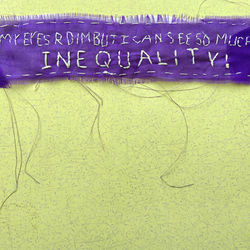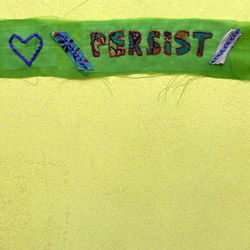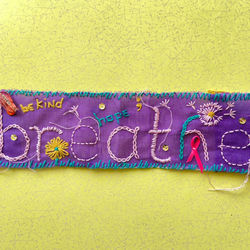Contemporary Community Textile Artist Derbyshire UK
Collaboration Kindness Carbon Sensitivity

String Of
Consciousness

International Women's Day Collaborative Stitch Project

Extract From The Writings Of A Participant
'As I sewed this piece, knowing my sisters were joining me, I felt such an ancestral abundance of LOVE to all women'
In 2021, I called for women and girls worldwide to unite and create a community textile project during the COVID lockdown. That year's International Women's Day theme was #ChooseToChallenge, and this community driven textile art initiative brought together over 100 women who wanted to show their willingness to 'challenge' despite being restricted to their homes.
A virtual village was to be formed to honour the clootie tradition. 'Clootie' is Scots for a rag or cloth. Historically, our ancestors tied strips of cloth to ancient sites and trees, usually around a water source. They came together in a symbolic act of hope and solidarity, intending to manifest good health, a cure, and a better year.
This tradition was what the project was to replicate, but with each participant joining from where they were covid isolating.
It Took A Village
Many people, places, methods of communication and organisations to come together to share their resources, energies and expertise to make this project happen.
Packs were made and sent out to allow us to make clooties from unused suffragette sashes. I believe in reuse, repurpose, and recycle, and that no one should be left behind. The packs contained everything needed to participate: needle, threads, tailor's chalk, pins and instructions.
The sashes were provided by Artichoke and had been originally used to celebrate the 100th anniversary of the 1918 Representation of the People Act, which gave the first British women the right to vote and stand for public office. One hundred years later in 2018, women across the UK joined together and wore white, green and purple coloured suffrage sashes to mark this historic moment. With the sashes that remained, they offered them to be used in this project; women were to come together once again but from isolation instead of mass art participation.
The threads were donated by Leicester Embroiderer's Guild from the donations that they have made to them from stitchers and estates of stitchers.
The bobbins were made from recycled cardboard, cut to shape by an army of volunteers, who added a written message of hope on each to their pack recipient, which was revealed slowly as the thread was used. This team also constructed the envelopes which were made from a pattern sewn together from the sashes. In doing this we negated the need for any additional packaging, using as little resources as possible.
The tailor's chalk came from a broken box placed for sale on ebay by a manufacturer offered for sale at a reduced price as they could not now sell it. This avoided this item going into landfill.
I gave from my supplies the fabric stiffener provided in the pack to stabilise the stitches as my gift to each and every woman. Also, hand drawing the instruction sheet to ensure as much human connection as was possible in this time of isolation.
The packs were made up by staff at King Edward VI College in Nuneaton, where I was the artist in residence. This organisation also kindly donated all of the photocopying.
Stitching For Wellbeing - Holism
The project was open to all, regardless of resources, geography, time difference, or stitching ability. Two hundred worldwide women took up the opportunity. We found ways to come together and chose to challenge through three steps, which are best described using three of the concepts of the New Economics Foundation's 'Five Ways To Wellbeing,' as its aims were to positively impact its community as holistically as possible:
1. Connect: Each fabric envelope was specifically designed to be unfurled and cut into three equal ribbons. The first ribbon was intended to be a gift for the participant. She was asked to stitch a word or phrase mindfully that she had never heard before but was something she had always needed to hear. While rhythmically moving the needle and thread through the material, she was supposed to absorb the words and feel the benefit of acknowledging them. She was encouraged to connect with that inner part of herself. An online forum and instruction films centred on slow, mindful stitch were provided to ensure no one was left behind and everyone could collaborate and revel in as much or as little connection as needed. The second ribbon was meant to provide an additional opportunity to connect, where the participant was asked to give the ribbon to another woman and encourage her to stitch the same healing word practice. Some women stitched together outdoors and chatted; some gave their second ribbon to a neighbour, while some taught others to stitch and share their skill.
2. Be Active: On International Women's Day and Mental Health Awareness Day, all participants were invited to tie ribbons that they had stitched outdoors to a gate, a tree, a bush, or any other suitable structure, and let their written words float away on the breeze using a clootie tradition. Women from all over the world took part and shared their experiences by submitting photographs and writing a short story that they were happy to have read by others. It was a beautiful act of unity and solidarity, with photographs shared in the group. Despite our differences through this collaborative community textile project, we shared similar desires to make a positive change and create a better world for all. This project was a testament to the power of community, creativity, and hope.
3. Give: The third ribbon was the key to a masterpiece. It was a symbol of hope and positivity that would be used to create a collaborative community piece. As we stitched the ribbon together, we wove our strengths and weaknesses, our hopes and dreams, into a tapestry that represented our collective resilience. The final product was to be a beautiful, inspiring work of art that left a lasting impact on everyone. We came together with passion and creativity to create something truly magnificent that would be given to a wider audience.
In conclusion, the process of creating a collaborative community piece can be a powerful way to bring people together and promote resilience. By stitching our strengths and weaknesses, hopes and dreams, into a piece, we can create a beautiful work of art that inspires and uplifts all who see it.
The third ribbon, a symbol of hope and positivity, was a key ingredient in this process, helping to bind us together and create something truly magnificent. With passion, creativity, and a commitment to collaboration, we can create a lasting impact and leave a positive mark on the world.
Our next stage was for the third ribbons to be moulded into a lantern to be shared and carried by women in the Coventry City of Culture programme.
Video Gallery
 |  |  |
|---|---|---|
 |  |  |
 |  |  |
 |  |  |
 |  |  |
 |  |  |
 |  |  |
 |  |  |
 |  |  |
 |  |  |
 |  |  |
 |  |  |
 |  |  |
 |  |  |
 |  |  |
 |  |  |
 |  |  |
 |  |  |
 |  |  |
 |  |  |
 |  |  |
 |  |  |
 |  |  |
 |  |  |
 |  |
Ribbon Gallery
Project Gallery

































